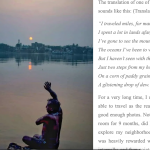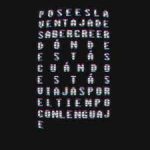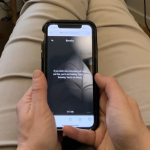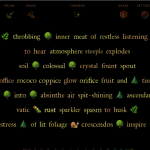electropoetics
Indian Solo Electronic Writing and its Modernist Print Anxiety

Building on the work of Souvik Mukherjee (2017), T. Shanmugapriya and Nirmala Menon (2018, 2019), Samya Brata Roy identifies emergent elements of a multimodal E-Lit tradition in India.
Appropriationist Practices and Processes of De/Subjectivation: Charly.gr, Matías Buonfrate and C0d3 P03try in the age of algorithmic governance

For Saint Augustine, biblical scripture was indispensible to his being able to finish the final draft of his life story. Hemingway advocated stopping midway in a sentence, to ensure a fresh start tomorrow. For us today in the age of algorithmic governance, our stories are more likely to be generated continuously through the words of others using Google search, autocomplete and the algorithm’s statistically-informed guess. In this article, Fernanda Mugica explores the real time writing in charly.gr’s Peronismo (spam), from 2010, a visual poem that combines music and text; Matías Buonfrate's “No poseas un miedo” (2020); and Argentine poet Francisco López Merino's C0d3 P03try.
Speculative Interfaces: How Electronic Literature Uses the Interface to Make Us Think about Technology

In a study that traverses more than half a century – going from e-lit precursor Christopher Strachey’s M.U.C. Love Letter Generator (1952) to Michael Joyce’s experimental hypertext afternoon: a story (1990) to Kate Pullinger’s data-driven touchscreen work Breathe (2018) – Rettberg (University of Bergen, Norway) situates experimentation with digital interfaces in a longer tradition of innovation in literary and scholarly production. She also argues for the central importance of such experimentation in the ongoing development of both electronic literature and the digital humanities, suggesting that speculation in the design of digital interfaces can help preserve and extend the interpretative and intuitive aspects of Western literary and scholarly traditions, while also bringing the limitations and exclusions of such knowledge systems into focus.
Making Writing Harder: Computer-Mediated Authorship and the Problem of Care

Literary forms seen as tools of mind transgressing the field of the literary and repurposing digital media so that they are capable of refocusing cognition in beneficial ways – these are the lines of thought shaping Kyle Booten’s analysis of algorithmic co-writers. To be able to respond to both challenges, it is proposed that researchers rigorously and systemically study how digital tools are being creatively used and repurposed, learning from models that have emerged within the mainstream Human-Computer Interaction research.
In Conversation with the Decameron 2.0

Jin Sol Kim and Lulu Liu interview the Decameron 2.0, a Canadian collaborative made up of professors and artists who are inspired by Giovanni Boccaccio’s plague narrative The Decameron (1348-1353) to develop creative works during and in response to the COVID-19 pandemic.